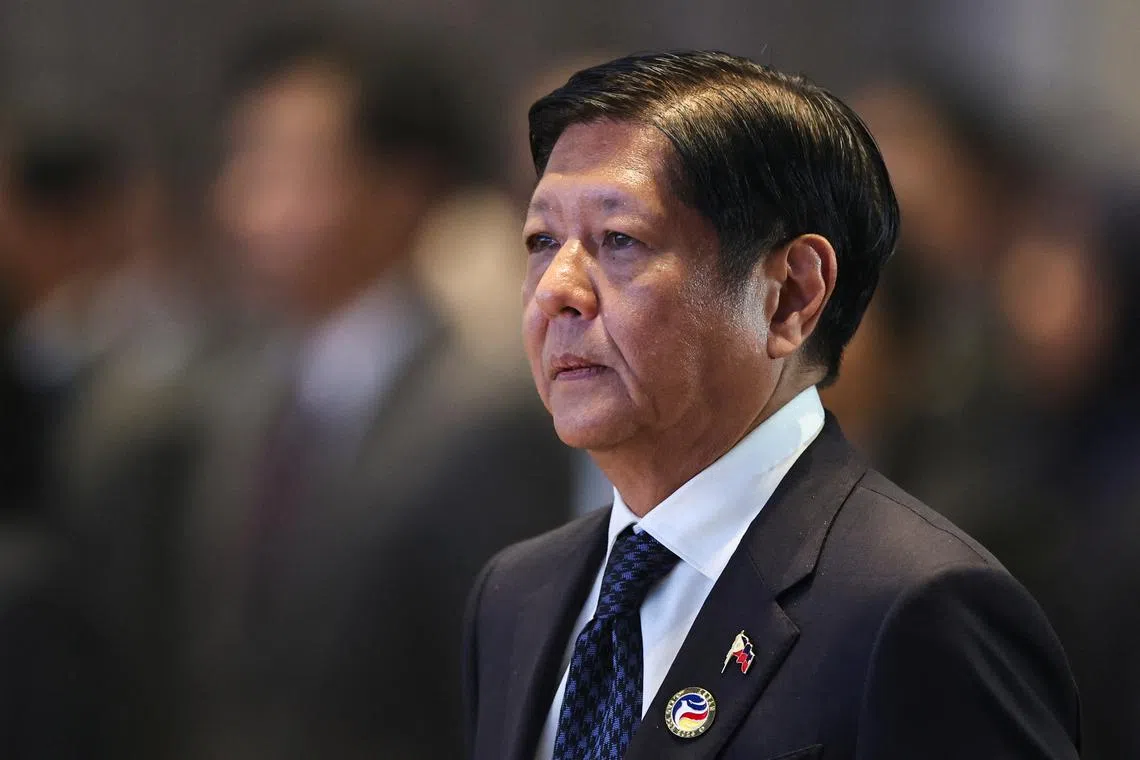Philippines’ Marcos says he will not block ICC if ex-president Duterte wants to be investigated
Sign up now: Get insights on Asia's fast-moving developments

The Philippines will not cooperate with the ICC, but it has obligations with Interpol, Philippine President Ferdinand Marcos Jr said.
PHOTO: REUTERS
Follow topic:
MANILA - Philippine President Ferdinand Marcos Jr said on Nov 14 his government would not block the International Criminal Court (ICC) if former leader Rodrigo Duterte wants to be investigated for alleged crimes against humanity in his anti-drugs crackdown.
The Philippines will not cooperate with the ICC, but it has obligations with Interpol, Mr Marcos told reporters.
"If that's the wish of (Duterte), we will not block ICC. We will not just cooperate," Mr Marcos said. "But if he agrees to be investigated, it is up to him."
The remarks follow a marathon congressional hearing on Nov 13 during which Mr Duterte, president from 2016 to 2022, refused to apologise for his role in the bloodshed and urged the ICC to start its investigation.
Mr Duterte remained defiant during the Nov 13 hearing as he defended his drug crackdown, which was a key plank of his election campaign, during which he had promised thousands of drug pushers and criminals would be killed.
“I have nothing to hide. What I did, I did it for my country and for the young people. No excuses. No apologies. If I go to hell, so be it,” said the 79-year-old Duterte during the hours-long hearing, which was also attended by families of drug war victims.
“I am already old, I might die soon. You might miss the pleasure of seeing me standing before the court hearing the judgment, whatever it is,” Mr Duterte said, adding he assumed full responsibility for what happened.
All testimony provided by Mr Duterte will be assessed to see their legal consequences, Mr Marcos said.
Mr Duterte unilaterally withdrew the Philippines as a member of the ICC
He questioned its authority to conduct an investigation, and insisted during the Nov 13 hearing that it no longer has no jurisdiction over the Philippines.
Mr Marcos said the government was monitoring developments because responsibility for the extrajudicial killings had not been established.
“And we had the mothers of some of the victims that were there, and up to now, they have not seen the justice for the murders of their children,” he added.
Police said that under Mr Duterte, they killed 6,200 suspected dealers who had resisted arrest during their anti-drug operations.
But human rights groups believe the real toll to be far greater, with thousands more users and peddlers gunned down in mysterious circumstances by unknown assailants.
The authorities at the time said those were vigilante killings and drugs gangs eliminating rivals.
Rights groups and some victims accuse police of systematic cover-ups and executions, which they deny. REUTERS

